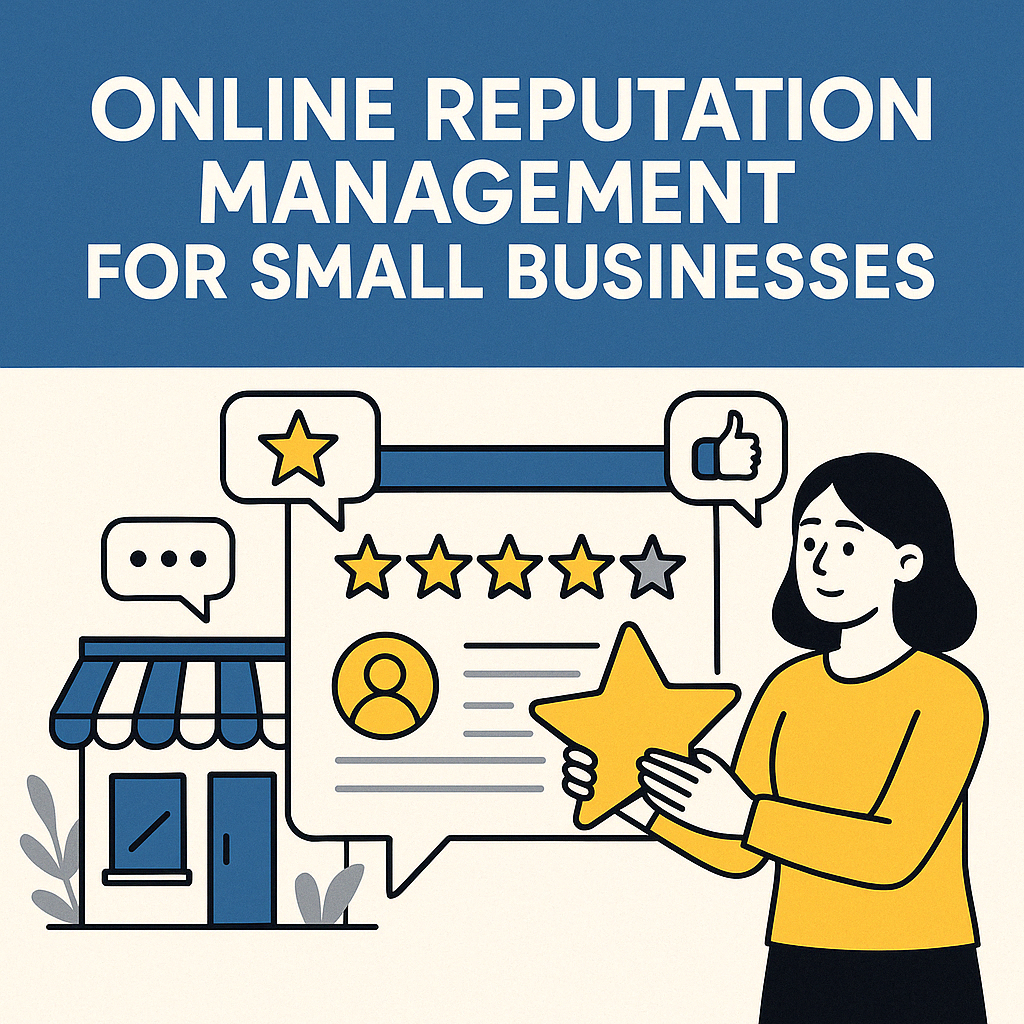Alternative Title Options
- The Ultimate Guide to Small Business Reputation Management
- How to Build and Protect Your Small Business’s Online Reputation
Why Reputation Management Matters for Small Businesses
In today’s consumer-first world, people are making buying decisions in seconds, often based solely on what they see online. Whether you’re a local coffee shop, a boutique law firm, or an eCommerce startup, your reputation is your strongest currency. According to BrightLocal’s Local Consumer Review Survey, 98% of consumers read online reviews for local businesses.
Even more telling? 49% trust those reviews as much as personal recommendations. The takeaway: ignoring online reputation management (ORM) isn’t just risky—it’s a potential revenue killer.
What Is Online Reputation Management for Small Businesses?
Online reputation management for small businesses refers to the strategies and practices used to monitor, influence, and maintain the perception of your brand across the internet.
It involves:
- Monitoring online mentions of your business
- Responding to customer reviews
- Publishing positive content
- Suppressing or addressing negative information
- Building brand authority through consistent presence
The Impact of Online Reputation on Business Success
Online reviews, social media feedback, and search engine results directly influence consumer behavior. A single 1-star difference on a review site like Yelp or Google can result in a 5-9% difference in revenue.
Moreover:
- 94% of consumers say a bad review has convinced them to avoid a business
- 60% of consumers won’t use a business with a negative review that hasn’t been addressed
- 70% will leave a review if asked by the business
These stats underscore how ORM isn’t optional—it’s essential.
Key Elements of a Small Business Reputation Strategy
1. Audit Your Online Presence
Before you can improve anything, you need to know what you’re working with. Start with a reputation audit:
- Google your business name
- Check your Google Business Profile
- Browse review sites like Yelp, Trustpilot, and Better Business Bureau
- Search social media hashtags, mentions, and comments
Look for common themes in negative and positive feedback.
2. Claim and Optimize All Listings
Local SEO and ORM go hand in hand. Make sure you’ve claimed and optimized the following listings:
- Google Business Profile (add accurate hours, services, images)
- Yelp, Bing Places, Apple Maps
- Industry-specific directories (Avvo for attorneys, Healthgrades for doctors, etc.)
Consistency is key across:
- Business name
- Phone number
- Address
- Hours of operation
3. Proactively Generate Positive Reviews
Positive reviews are the foundation of small business reputation management. Here are practical ways to get more of them:
- Ask in person after a positive interaction
- Send follow-up emails post-purchase
- Use SMS review request tools
- Include review links in receipts or newsletters
Remember: never offer rewards in exchange for reviews—it violates most platform policies.
4. Respond to Reviews (Both Good and Bad)
Timely and thoughtful responses to reviews show potential customers that you care.
How to Handle Positive Reviews
- Express gratitude
- Reinforce the customer’s experience
- Encourage future visits
How to Handle Negative Reviews
- Respond calmly and professionally
- Acknowledge the concern
- Offer to resolve the issue offline
- Avoid blame or defensiveness
Example Response:
Hi [Name], thank you for your feedback. We're sorry to hear about your experience and would love the opportunity to make things right. Please contact us at [phone/email].5. Use Social Listening Tools
Social media is a common ground for discussions about your brand. Tools like:
- Hootsuite
- Mention
- Brand24
- Google Alerts
…can help you track brand mentions in real-time. Set up alerts for your business name, product names, and even staff if relevant.
6. Publish Trust-Building Content
Content marketing can build authority, especially when addressing your audience’s concerns. Examples:
- Customer testimonials
- Behind-the-scenes videos
- Blog posts answering common questions
- Educational content around your industry
Publishing consistently helps suppress negative results in search and positions your brand as the go-to expert.
7. Protect Against Defamation and False Claims
Sometimes, negative content can go beyond criticism into outright defamation. This is where services like Defamation Defenders can help remove false content and repair reputational damage through:
- Content removal strategies
- Search result suppression
- Legal takedowns (where applicable)
Their solutions are designed specifically for individuals and small businesses who want to reclaim control over their search presence.
Small Business Reputation Management: Advanced Tips
Get Involved in Local Communities
Participate in local events, sponsor causes, and support nonprofits. These initiatives often earn:
- Press mentions
- Local backlinks
- Positive social chatter
Optimize for Branded Search Queries
Make sure your website ranks first for your own business name and related terms.
How?
- Publish an FAQ page
- Use schema markup (especially local business)
- Create profiles on trusted platforms (LinkedIn, Crunchbase, etc.)
Set a Crisis Management Plan
When a scandal or sudden attack occurs, have a protocol:
- Pause all scheduled content
- Acknowledge the issue quickly
- Communicate steps being taken
- Work with ORM professionals if needed
Tools to Supercharge Your Reputation Strategy
- Trustpilot: Manage and display reviews on your site
- Birdeye: For multi-platform review aggregation
- Whitespark: Local citation building
- Reputation.com: Monitor and manage mentions (for enterprises)
- Defamation Defenders: Suppress or remove negative content
Frequently Asked Questions (FAQ)
The most effective strategy includes proactive review generation, timely responses, social listening, and publishing helpful content to dominate search results.
Only reviews that violate a platform’s terms (e.g., fake, defamatory, spam) can be removed. Otherwise, you must respond and outweigh them with positive ones. For serious false claims, Defamation Defenders can assist.
Respond with professionalism. Acknowledge the issue, apologize if appropriate, and offer a resolution. Avoid arguing in public forums.
At least 10-20 reviews on your Google Business Profile, with recent activity, improves visibility and trust.
Depending on the severity, it can take anywhere from a few weeks to several months. The earlier you start, the faster the turnaround.





